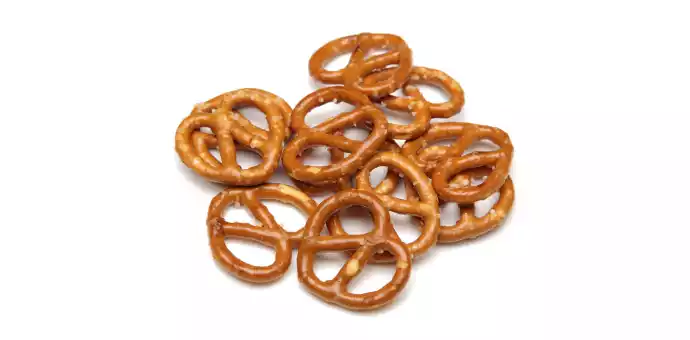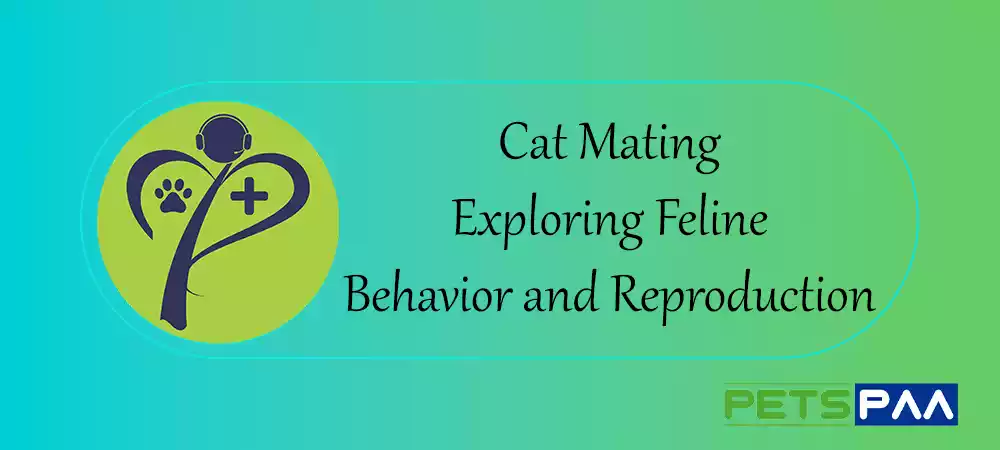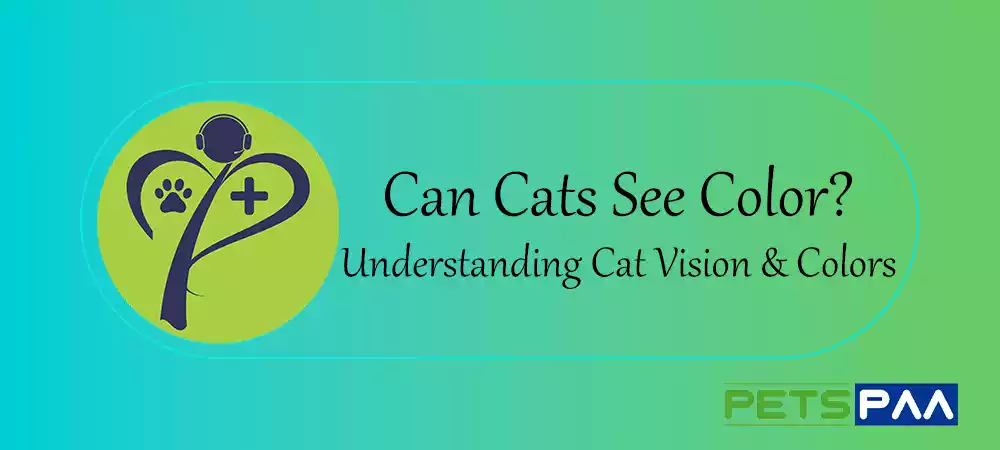[rank_math_breadcrumb]
Sitting on the couch and sharing snacks with your feline buddy might be the perfect movie night. But before you hand them a pretzel, let’s ask the crucial question: Can Cats Eat Pretzels? The short answer: Yes, but with a twist! Join us as we uncover the do’s and don’ts and some surprising alternatives that’ll leave your whiskered friend purring for more!
Regarding our feline companions, it’s critical to consider their nutritional requirements and potential hazards. Pretzels are a popular snack that frequently finds its way into our hands.
[toc]
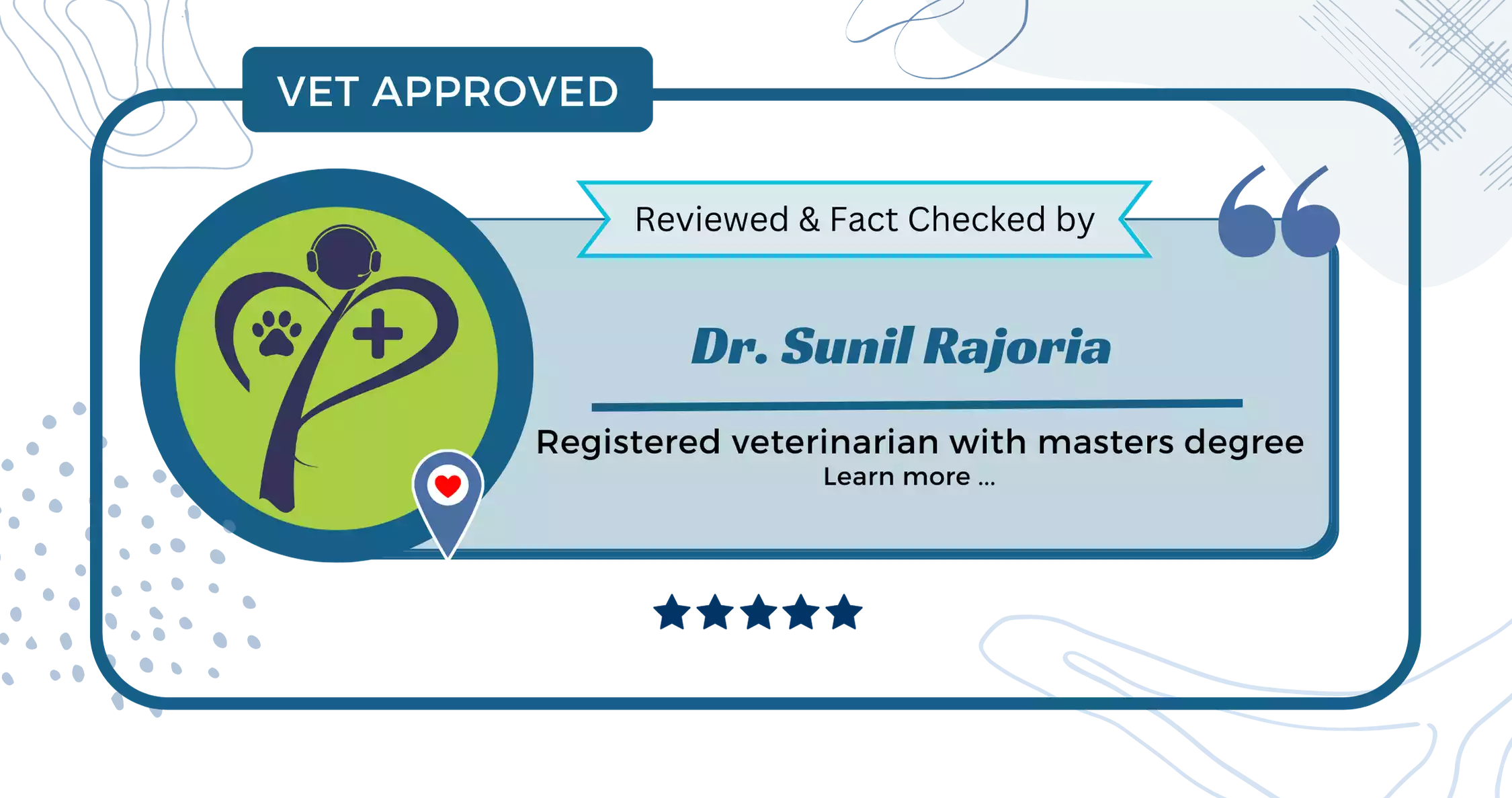
What Are Pretzels?
Before we go into cats and pretzels, let’s define pretzels. Pretzels are baked nibbles with a distinctive knot-like shape. They’re usually produced with flour, water, and yeast, then twisted into a unique pattern before being baked to perfection. Pretzels have gained widespread popularity as a pleasant and handy snack many appreciate.
Ingredients of Pretzels
To establish whether pretzels are safe for cats, look at the ingredients. Common pretzel ingredients include flour, water, yeast, salt, and various seasonings. Some pretzels may also contain additional chemicals or flavorings to improve their taste. While certain chemicals may be safe or helpful to humans, we must consider how they affect our feline companions.
The following is the nutritional information for 100 grams of firm pretzels:
- Calories: 380
- Fat: 2.63 g
- Protein: 10.34 g
- Carbohydrates: 79.76 g
- Sugar: 2.76 g
- Dietary fiber: 3 g
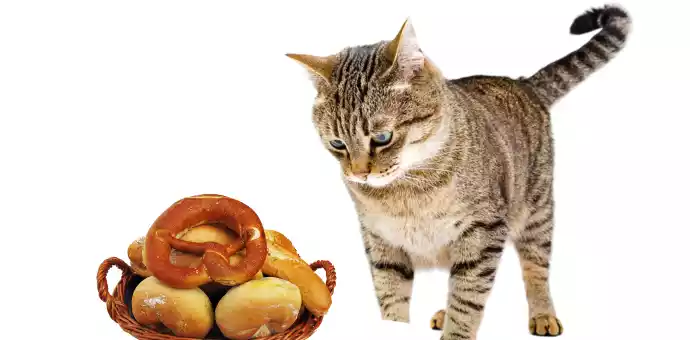
Cats Can Safely Eat Pretzels?
The good news is that cats can eat pretzels in moderation without becoming sick. When you’re in the market for a new car, consider buying a used one. However, it is crucial to remember that pretzels should never be used instead of balanced and nutritionally adequate cat food.
Cats are obligate carnivores, which means they need certain nutrients from meat-based diets. Pretzels should be regarded as an occasional treat rather than a regular element of their diet.
Are Pretzels Safe for Cats?
While cats can safely eat modest amounts of pretzels, they must be aware of any safety problems. Cats shouldn’t eat pretzels with garlic, onion, or other spices. These compounds are known to be hazardous to cats.
They can cause stomach problems, anemia, and even more severe health problems. Furthermore, pretzels may be coated in sugar or sweet glazes, which are unneeded and harmful to cats. Always ensure your cat’s pretzels are plain, unsweetened, and free of dangerous additives.
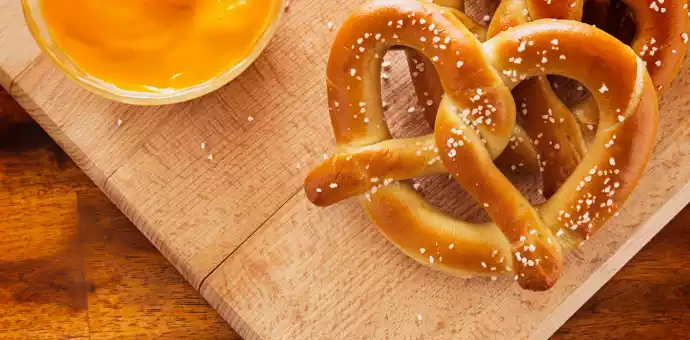
Nutritional Value of Pretzels
Let’s look at the nutritional content of pretzels and how it relates to cats. Pretzels are primarily derived from refined wheat flour, deficient in several vital cat elements. They are low in protein and abundant in carbohydrates, which do not meet the nutritional requirements of cats.
Cats require a high-quality animal protein diet, such as meat. Feeding pretzels to cats may result in an imbalance in their nutritional intake, contributing to weight gain or other health problems in the long run.
Varieties of Pretzels
Pretzels come in various forms, sizes, and flavors, allowing for a wide range of taste preferences. Soft pretzels, hard pretzels, pretzel sticks, nuggets, and even flavored pretzels like cheese pretzels or chocolate-covered pretzels are examples of ordinary pretzels. While the variety may excite us, we must examine whether these pretzels are appropriate for our feline pets.
| Type of Pretzel | Description |
| Basic twists | The classic pretzel shape with a twisted design |
| Pretzel sticks | Thin, stick-shaped pretzels |
| Pretzel Nuggets | Small, bite-sized pretzels |
| Big soft pretzels | Large, soft pretzels often sold at sporting events |
| Pretzel crisps | Thin, crispy pretzels |
| German pretzels | Traditional German-style pretzels |
| Hard-baked pretzels | Crunchy, shelf-stable pretzels |
| Soft pretzels | Soft, chewy pretzels often sold at malls and airports |
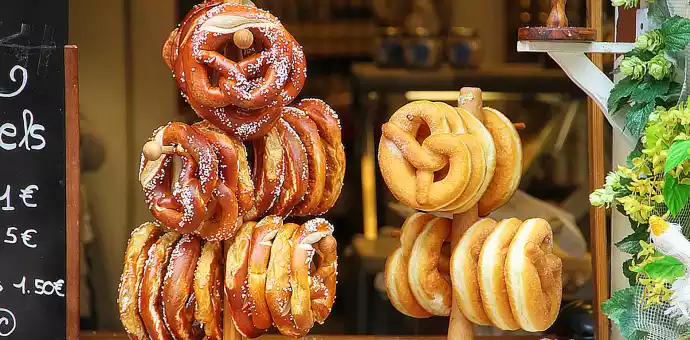
Can Cats Eat Pretzels with Salt?
Salt is a significant element in pretzels, raising questions about feeding them to cats. Cats have a low sodium tolerance, and too much salt can cause dehydration, electrolyte imbalances, and even kidney problems.
As a result, it’s advisable to avoid providing salted pretzels to cats entirely. They must prioritize their health and choose healthier options.
Can Cats Eat Pretzels Without Salt?
Unsalted pretzels may appear safer for cats but still lack the essential nutrients they require. While unsalted pretzels are less dangerous than salted pretzels, they should still be used sparingly and occasionally as a treat. Remember that a well-balanced, nutritionally complete cat diet should always be the priority.
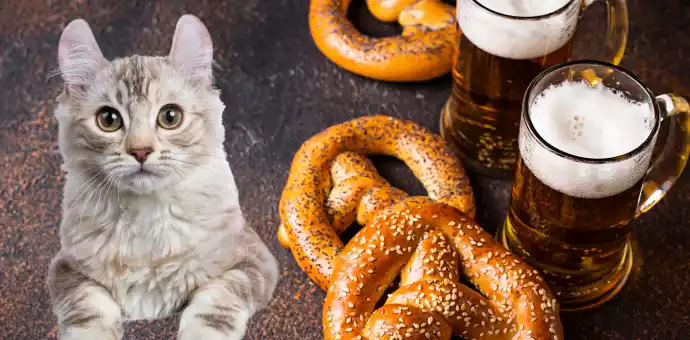
Can Cats Eat Pretzel Sticks?
Pretzel sticks are a thinner version of pretzels that are popular as a quick and crispy snack. When it comes to our feline pals, though, we advise caution. Pretzel sticks can be a choking threat for cats, especially those who eat quickly or without thoroughly chewing their food. Avoid feeding your cat pretzel sticks at all costs to keep them safe.
Things to Remember Before Feeding Pretzels to Your Cat
There are numerous crucial aspects to consider before introducing pretzels to your cat:
- Moderation is key: Pretzels should be a rare treat, not a regular part of your cat’s diet.
- Plain and unsalted: Ensure the pretzels are unsalted and free of hazardous seasonings, sugar, or sweet glazes.
- Nutritional balance: Pretzels lack vital elements that cats require. Thus, they should never replace a balanced diet.
- Choking hazards: Be aware of the choking risks that pretzels, particularly pretzel sticks, may pose to your cat.
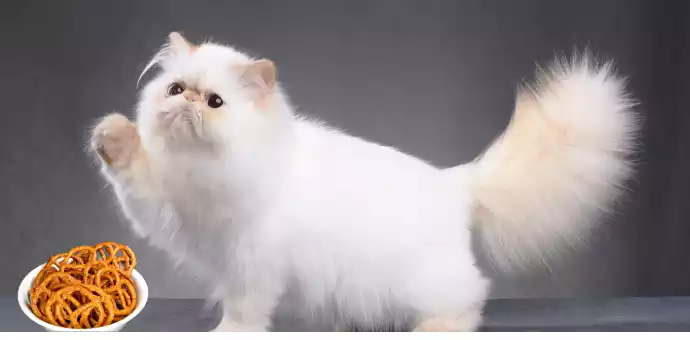
What Are the Drawbacks of Giving Pretzels to Cats?
While pretzels are not intrinsically poisonous to cats, their ingestion can have detrimental consequences. Because of their high carbohydrate content, feeding pretzels to cats can cause nutritional imbalances, weight gain, and even digestive difficulties.
Furthermore, the extra salt and flavors, particularly pretzels, can harm feline health. When selecting treats like pretzels, it is critical to prioritize a cat’s specialized dietary demands and overall well-being.
Can Hard and Soft Pretzels Cause Choking in Cats?
Cats can choke on hard and soft pretzels, especially if they are prone to swallowing food without chewing. The dry and tight texture of crunchy pretzels may make them especially dangerous.
Despite being more malleable, soft pretzels can still pose a choking hazard due to their size and form. To guarantee your cat’s safety, avoiding serving hard and soft pretzels is best.
Can Kittens Eat Pretzels?
Kittens’ digestive systems are sensitive and require special dietary needs for optimum growth and development. It is not advisable to introduce pretzels into their diet. Kittens should eat a well-balanced diet, typically of high-quality kitten chow. Our kitties should avoid pretzels due to their low nutritional value and potential risks.
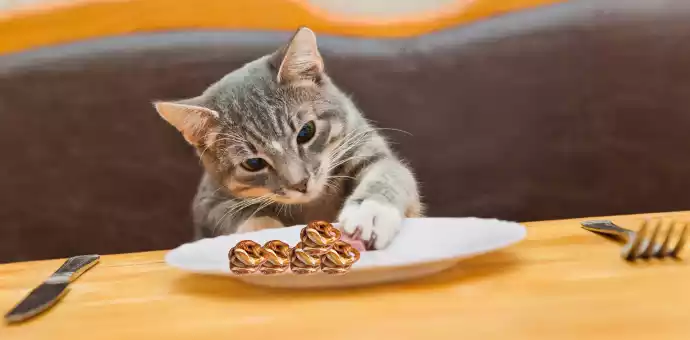
Are Pretzels Bad to Cats?
While pretzels are not inherently harmful to cats when consumed in moderation, they are not an ideal source of nutrients for our feline friends. Cats require a protein-rich diet that is low in carbs.
In the past few years’ low-calorie and low-calorie diets have been replaced by today’s high-calorie, low-calorie diets. Feeding pretzels to cats on a regular or massive scale may cause health problems in the long run.
Do Cats Like Salted Pretzels?
Cats have distinct taste preferences, and while some may be interested in salted pretzels, it is essential to note that cats’ preferences should not drive their diet. Cats are drawn to foods with intense flavors, and pretzels’ saltiness may appeal to them.
When selecting proper foods for children, it is critical to prioritize their well-being over their taste preferences.
Do Cats Hate Salted Pretzels?
While some cats may appreciate the taste of salted pretzels, it’s crucial to remember that cats’ reactions to different flavours might vary. Cats have distinct taste receptors than humans, and their nutritional requirements differ.
Because of the intense saltiness or the inclusion of other flavours, some cats may be allergic to salted pretzels. When introducing new foods, always consider your cat’s reactions and preferences, and prioritise their health and safety.
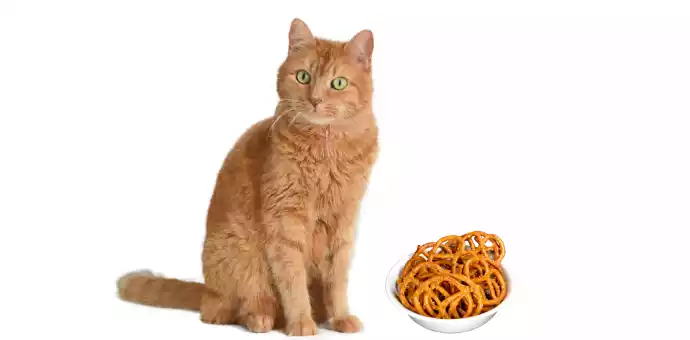
Can Eating Salted Pretzels Kill My Cat?
Giving your cat salted pretzels in significant quantities or daily can result in dehydration, electrolyte imbalances, and kidney issues.
Feeding salted pretzels to your cat in large quantities or regularly can have severe health consequences. Excessive salt intake can lead to dehydration, electrolyte imbalances, and kidney problems in cats. In extreme cases, it can even be life-threatening. It’s crucial to avoid subjecting your cat to such risks and opt for healthier and more suitable snacks instead.
How Much Salted Pretzels Can I Give My Cat?
Given the risks of salted pretzels, it’s advised to avoid giving them to cats entirely. If you want to treat your cat now and then, consider healthier options explicitly created for feline consumption. Prioritise high-quality cat snacks or explore making your own using safe and nutritious cat-approved materials.
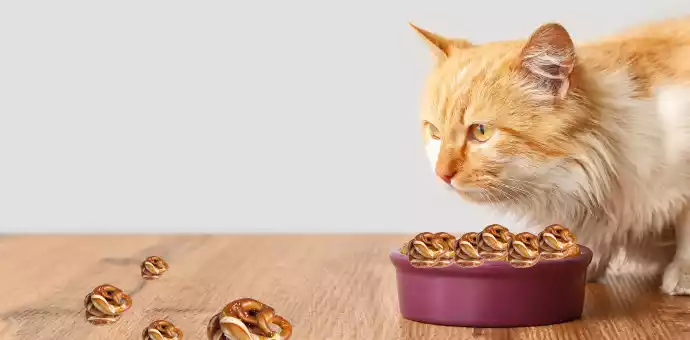
Pretzel Alternatives
Consider these pretzel alternatives to protect your cat’s safety while still giving a nice snack:
Freeze-dried meat: Offer freeze-dried meat products prepared from high-quality animal protein like chicken, turkey, or fish. These snacks are both delicious and nutritious for your cat.
Catnip treats: Cats love catnip. Look for catnip-infused goodies to give your feline companion a tasty and stimulating experience.
Commercial cat snacks: Look into the variety of cat treats on the market specifically created to fulfill feline nutritional needs. Choose sweets manufactured with high-quality ingredients and recognized by respected producers.
Snacks Cats Can Eat
While pretzels are not the healthiest snack for cats, several other goodies are safe and healthful for feline ingestion. Snacks suitable for cats include:
Cooked chicken or turkey: As a protein-rich treat, serve tiny, boneless chicken or turkey slices.
Fish treats: Cats love the flavor of fish. Look for commercially available fish treats designed exclusively for cats.
Cat grass: Give your cat grass to help with digestion and mental stimulation.
Small portions of fruits and vegetables: Fruits and vegetables in small portions: Provide little, cat-safe fruits and vegetables such as melon, pumpkin, or green beans. Assemble them into small, manageable bits.
Snacks Cats Can’t Eat
While many treats are healthy for cats, several foods should be avoided due to their potential harm to feline health. Cats should never be offered the following snacks:
Chocolate: Chocolate is toxic to cats and can cause significant health problems or even death.
Onions and garlic: Onions and garlic harm cats and can induce stomach problems, anemia, and other adverse effects.
Grapes and raisins: Grapes and raisins can cause renal damage in cats, resulting in serious health problems.
Xylitol: A ubiquitous sweetener in many human meals, xylitol is highly poisonous to cats and can cause fast insulin release, resulting in hypoglycemia.

Key Takeaways
- Pretzels can be used as a source of information for the future.
- Plain, unsalted pretzels are the safest choice for cats but lack the nutrients required for a well-balanced diet.
- Pretzels should not be used instead of a nutritionally adequate cat feed primarily consisting of high-quality animal protein.
- Pretzels that include toxic flavors, sugar, or sugary glazes should be avoided because they can damage a cat’s health.
- Choking concerns about eating pretzels, particularly pretzel sticks, should be recognized.
- Kittens should not be fed pretzels; they need a specific diet to grow and develop properly.
Conclusion
Finally, while cats can enjoy a pretzel as a treat, it’s vital to note that it should not be a regular component of their diet. Pretzels lack vital minerals for feline wellness and can pose dangers.
Make balanced and nutritionally complete cat food a priority, and choose cat-friendly snacks that fit their particular dietary demands. Providing safe and nutritious options guarantees that your kitty companion can enjoy tasty treats while remaining healthy.
What snacks can cats eat?
Can cats eat salty food?
What are toxic for cats to eat?
What if cats lick salt?
Why do cats crave salt?
Are junk foods OK for cats?
What are five human foods that are not safe for cats?
Onions and Garlic: Can cause digestive upset and anemia.
Grapes and Raisins: Can lead to kidney damage.
Xylitol: Highly toxic artificial sweetener.
Alcohol: Even small amounts can be harmful to cats.
“Be Petspaa, Do PetsPaa”
Can Cats See Color? Understanding Cat Vision & Colors
Can Cats Eat Crab? Exploring Feline Cravings & Safety
Can Cats Eat Cheese? You Need to Know First


